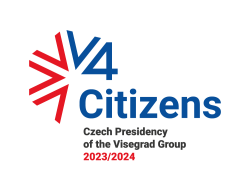
| Wed | Thu | Fri | Sat | Sun |
|---|---|---|---|---|
| 8 | 11 | 14 | 20 | 23 |
| Wed | Thu | Fri | Sat | Sun |
|---|---|---|---|---|
| 10 | 12 | 15 | 21 | 24 |
| Wed | Thu | Fri | Sat | Sun |
|---|---|---|---|---|
| 10 | 13 | 16 | 18 | 21 |
| Wed | Thu | Fri | Sat | Sun |
|---|---|---|---|---|
| 11 | 13 | 17 | 21 | 25 |
#V4books: On In the Name of the Father by Balla
Balla has been called the “chief alchemist of Slovak literature,” and “the Slovak Kafka”.

Initially focusing solely on Czech authors, the London-based Jantar Publishing has recently decided to broaden its range and cover literature from all four Visegrad countries. The publisher’s first venture into Slovak literature will be V mene otca (In the Name of the Father), an award-winning novella by Balla, to be translated by myself and my husband Peter and due to appear later this year.
Balla (who goes only by his surname) has been called the “chief alchemist of Slovak literature,” “the Slovak Kafka”, and “the uncrowned king of Slovak outsiders and misfits.” Balla made his name with a short story collection, Leptokaria, in 1996, and has since published nine further books, mostly of short fiction.
His latest novella, Veľká láska appeared in 2013. Balla — who has a day job in the local council at Nové Zámky, a provincial town in southern Slovakia, a region with a sizeable Hungarian minority — has been gradually gaining recognition in Slovakia: In the Name of the Father was voted Book of the Year by the daily SME in 2012, and, in the same year, he won both the Anasoft Litera Prize, Slovakia’s most prestigious award for an original work of fiction, and the Tatrabanka Foundation Art Prize for literature. He is increasingly being recognized in neighbouring countries as well: his works have been translated into Czech, German, Hungarian, Polish, Slovene and Serbian.
Balla’s stories are typically populated by a gallery of lonely, mediocre, often malicious and creepy individuals unable to relate to other human beings; dramatis personae who often find themselves in bizarre or surreal situations as they try to escape from the numbing banality of their everyday life.
The narrator of the bleakly humorous novella In the Name of the Father is a particularly nasty character: an unnamed pensioner whose professional ambition had been fulfilled by rising from shop assistant to manager in a hardware store where he pursued a string of sordid sexual escapades. As he reflects on his life, in a series of sketches of varying length, he displays a spectacular lack of insight, forever blaming others for his failed relationship with his parents and two sons, his serial adultery, the breakup of his marriage and his wife’s descent into madness. His rant is set against the backdrop of the stiflingly grey provincial lives that the narrator and his neighbours live as well as the mysterious forces emanating from the cellar of the house he has built with his brother. This devastating picture of small-mindedness, misogyny, and ignorance, a life bereft of any firm moral reference points, can be read as a parable of the country’s propensity for conformism and lack of ambition.
Julia Sherwood is a freelance translator based in London and editor-at- large for Slovakia with the international literary journal Asymptote.
Read the original text in Visegrad Insight.
This article has been automatically generated from the Visegrad Insight magazine website, a project funded by the International Visegrad Fund. The opinions expressed in this article do not necessarily have to represent the official position of the donor, the Visegrad Group, or the publisher (Res Publica Nowa).







